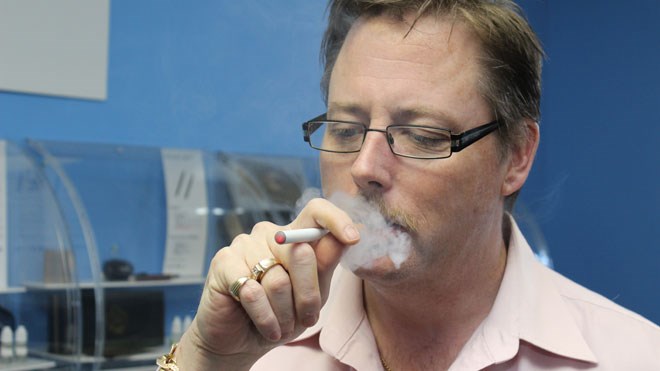Mike Mulligan said his electronic cigarette business has the potential for a lot of growth in the next few years, if it isn't shut down by Health Canada first.
Mulligan owns ECIG Canada, a supplier of electronic cigarettes, or e-cigarettes, as they are commonly called, with an online shipping centre on Barrydowne Road, and a storefront in the TD Canada Trust building on Elm Street.
Mulligan first heard about e-cigarettes five years ago, and immediately ordered a device from China.
“What a fantastic product,” he said. “I loved it so much I decided to open the business here in Sudbury.”
E-cigarettes are touted by their sellers as healthier alternatives to cigarettes, and effective smoking cessation products.
“They are harmless,” Mulligan told Northern Life. “It's a water vapour, so it doesn't let out any carcinogens like a real cigarette.”
But e-cigarettes are not approved by Health Canada, and technically remain illegal.
“E-cigarette products, including e-liquids, that contain any amount of nicotine or have a health claim, fall within the scope of the Food and Drugs Act, and require approval by Health Canada before they can be imported, advertised or sold in Canada,” said Blossom Leung, a Health Canada spokesperson, in an email to Northern Life. “To date, no such products have been approved.”
Cheryl Harvey, a registered nurse with the Sudbury and District Health Unit, who works with the tobacco prevention team, said because e-cigarettes are unregulated it is impossible to know exactly what they contain.
“Although they may not contain the 7,000 chemicals found in cigarette smoke they still contain some unknown chemicals that could pose a health risk,” Harvey said. “There is a lack of empirical evidence to support their safety.”
Harvey said e-cigarettes are also problematic because they re-inforce the act of smoking, and are used just like regular cigarettes.
“They are undermining public health efforts that aim to treat nicotine addiction and encourage abstinence,” she said.
Instead of burning tobacco, and other chemicals, the devices vaporize a variety of liquids that are inhaled by the user.
“It's certainly not recommended for anyone who doesn't smoke now,” Mulligan said. “We totally discourage that.”
Mulligan said the e-cigarettes he sells in Canada do not contain nicotine. The liquids, he said, contain a mixture of propylene glycol, vegetable glycerol and flavouring. They are all produced in Canada, he added.
Those ingredients are used in a number of processed food products, but Harvey said their effects when inhaled have never been tested. Glycol is a common ingredient in fog machines used as concerts and other events.
The e-cigarettes Mulligan ships to other countries — in Europe and to the United States — do contain nicotine. Mulligan said health agencies in those countries have approved their use and sale.
On a typical day, Mulligan said, he sells about 100 e-cigarette kits, which retail for around $100, through his online store.
He has received a number of letters from Health Canada, asking for details about his business, and threats of fines that he said were never followed through.
“I like to co-operate with Health Canada,” Mulligan said. “It's better than fighting with them.”
The sale and importation of unauthorized e-cigarette products may be subject to compliance and enforcement actions under the Food and Drugs Act, said Health Canada spokesperson Leung.
“When a compliance issue is identified, Health Canada works with the affected company to mitigate risks to health and safety. Compliance is normally achieved through a co-operative approach between the regulated party and Health Canada,” she added.
But Mulligan said he believes e-cigarettes are only controversial because they pose a threat to the profitable tobacco industry. “What could be worse than a real cigarette?” he asked.
@jmigneault
Join Sudbury.com+
- Messages
- Post a Listing
- Your Listings
- Your Profile
- Your Subscriptions
- Your Likes
- Your Business
- Support Local News
- Payment History
Sudbury.com+ members
Already a +member?
Not a +member?
Sign up for a Sudbury.com+ account for instant access to upcoming contests, local offers, auctions and so much more.
